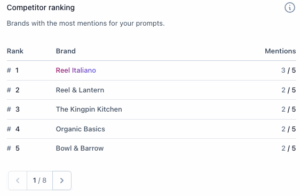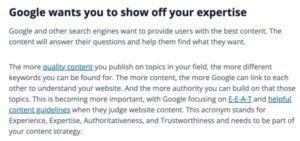Now that so many people use AI tools to create content, the questions about the credibility of those tools keep popping up. Can you really make AI-generated content and still meet Google’s E-E-A-T standards? Of course, the answer is yes, but there’s a limit to what you should let these tools do. Incorporating human insights in AI content can help uphold these standards.
AI is a tool, not a replacement for you
AI helps you move faster and do more, but it can’t replace humans (yet). Do you want readers to trust your content and have it seen as a reliable source in traditional and AI-driven search? Then, you need to have people involved in every stage of the content production process.
In this article, we’ll discuss how to combine AI content with human editing to maintain experience, expertise, authoritativeness, and trustworthiness. But we’ll also discuss what happens if you don’t do that.
AI can help you start, but humans make it credible
AI tools like ChatGPT, Claude, and Gemini are trained on enormous data sets. These tools are very good at outlining topics, summarizing facts, and writing initial, high-level drafts of articles. However, the benefits stop there, and going much further will present a risk.
You must remember that AI does not have the intent, context, or experience in your industry. With all the low-quality content that’s spit out daily, that matters more than ever. Google, using the AI Overviews and AI Mode, is trying to surface content that shows real insights from real people.
But why does human involvement matter so much? AI is great, but it often misses nuances and is prone to add filler to your content. It’s also very good at oversimplifying topics. And, because of the way these systems were taught, they cannot pick up evolving best practices or shifts that happen in the real world.
What’s more, if you let the AI run wild, it can even produce content that’s factually wrong. These hallucinations are so confidently written that they sound like they are true, which makes it harder to detect misinformation.
What to do?
It’s fine to use AI, but use it to help you structure content or brainstorm, and don’t publish anything directly. Always use real editors with real knowledge of the topics to fact-check, correct the tone, and make sure the message is on point. This helps you improve trustworthiness in E-E-A-T. You should show that you wrote your content with good intent and oversight.
Our Principal SEO, Carolyn Shelby, wrote The Role Of E-E-A-T In AI Narratives: Building Brand Authority For Search Success for Search Engine Journal. That article provides more insight into this topic.
Carolyn also wrote an insightful post on how to optimize content for AI LLM comprehension using Yoast’s tools.
Relying too much on AI can lead to risk
Remember that AI-generated content is not perfect. In fact, if you use it without having actual people working on it, it could hurt your visibility or reputation. In the end, this could hurt your business. But what are some of those risks when you over-rely on AI content?
False authority and misinformation
Search online and you’ll find many stories describing how AI wrote things that are just plain wrong. AI can misstate facts, make up statistics, and even come up with well-known experts that don’t exist. Publishing content like this in your brand’s name can damage your trustworthiness. What’s more, when search engines or visitors lose trust, it’s very hard to regain that.
Outdated or incomplete information
While there are many developments on this front, with grounding/RAG and LLMs connected to search, most models aren’t updated in real-time. These models often don’t know the latest insights until you specifically tell them. It’s easy to create outdated AI content when you don’t keep a very close eye on this.
Content redundancy
As you know, AI tools get data from existing sources, which will lead to content that looks a lot like content that’s already out there. If your content only repeats those same things, it’s very easy for search engines to ignore your site. It will be hard for Google to see your site as an authority on the topic.
Legal and compliance issues
There are many topics and industries that are very risky to publish on, for instance, the medical, financial, and legal fields. If your AI tool spits out incorrect advice and you publish without a human doing the fact-checking, your business could be found liable in court.
Trust breakdown with your audience
Remember that your readers are also developing a nose for AI content. When they sense that something sounds too generic or disconnected, they might move on to your competitor’s content, if that’s real. This will especially hurt industries that thrive on expertise and trust.
Add experience to strengthen the E’s
The biggest update of E-E-A-T was the addition of Experience. This is Google’s way of recognizing content created by people who have done or experienced what they wrote about. AI does not have this experience; real human beings do.
So, how do you do this? Be sure to include real stories from your team, clients, or projects, ideally with real names, results, and lessons learned. Give internal experts, such as engineers, consultants, or practitioners, a voice and direct input in your content. Don’t forget to interview team members and customers and use their perspectives in your content.
Giving your content more context can also make it stand out more, even in AI search. For instance, instead of simply writing “Solar panels reduce energy bills,” write, “After installing 28 commercial panels, our client in Portland, Oregon, cut annual costs by 35% — enough to pay off the system three years early.”
Make it easy for Google (and your audience) to trust you
Google’s systems, including AI Overviews and AI Mode, look at a lot more than just the words on your page. Google looks at all of the signals surrounding your business and yourself. These signals can help it understand if you and your content are trustworthy.
Improving your credibility signals for users and search engines starts by adding clear bylines with author bios that link to real credentials. This way, it’s easier to find out who is behind the content and why it makes sense for them to write about the topic. Support this with proper structured data, like schema markup for authors, products, reviews, and what else makes sense. Search engines use this to understand your content.
Remember to cite high-quality sources when referring to data instead of vague phrases like “research shows.” Also, set up a system to gather and use reader feedback so you can immediately fix things when they are unclear or plain wrong. Try everything to build and maintain trust while keeping content quality high.
Keep an eye on your Knowledge Graph. Try to get your brand and your experts or owners recognized as entities in search through structured data, Wikidata, Google Publisher Center, or by getting other citations. Think of authority and trust in E-E-A-T as something more visible, both to users and large language models (LLMs).
Always show who’s behind the content
AI content isn’t “real”. You, as a writer, are real. The best way to make your content real is by showing who wrote or reviewed it. Plus, you should show what makes them qualified to write about it. Transparency supports user trust and sets content apart from generic, anonymous posts.
Now, you don’t need a PhD from Harvard to be recognized as an expert for E-E-A-T, but you do need real-world, verifiable experience. In addition, you should publish author bios on your site with specific roles and industry backgrounds. You can also add an editorial or “reviewed by” credit for topics that your experts have fact-checked and edited.
Many big publishers have content guidelines and/or review policies that are available to read at any time. In those guidelines, you might have something simple, like what kind of disclosure you use when you’ve used AI to create a piece of content. That might be something simple like: “This article was drafted using generative AI and reviewed by [Editor Name], [Job Title] at [Company Name].”
Final thoughts
AI is a helpful tool for quickly generating content, but it shouldn’t replace real experiences, insights, or proper editing. Without the human element, you’ll miss the quality and trustworthiness needed to succeed with your content.
If you want your brand to be mentioned in AI search results and stand out amongst the competition, you need to make it clear that there are real people behind this content — real people with real knowledge and experiences.
Feel free to use AI where it can to speed up your work. But do make sure that the essential parts that your readers and search engines will value most are always human.
Google’s guidance on using AI-generated content (for quick reference)
The bottom line is that using AI is fine as long as the final content is accurate, original, clearly labeled when necessary, and actually helpful to users.
- Generative AI can support research and help structure original content—but using it to mass-produce low-value pages may violate Google’s spam policies, especially those related to scaled content abuse.
- Content must meet Google’s Search Essentials and spam policy standards, even when AI tools are involved.
- Focus on accuracy, originality, and value—this includes metadata like
</code> tags, meta descriptions, structured data, and image alt text.</li> - Always ensure your structured data aligns with both general and feature-specific guidelines, and validate your markup to remain eligible for rich results.
- Add transparency by explaining how the content was created—especially if automation was involved. This could include background details and appropriate image metadata.
- Ecommerce sites must follow Google Merchant Center’s policies, including correctly tagging AI-generated product data and images (e.g., using IPTC metadata).
- Review Search Quality Rater Guidelines sections 4.6.5 and 4.6.6 to understand how low-effort or unoriginal AI-generated content may be evaluated by Google’s systems.
The post Integrating human insight with AI-generated content: How to maintain E-E-A-T appeared first on Yoast.




